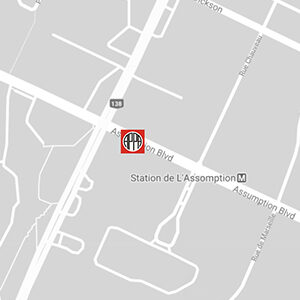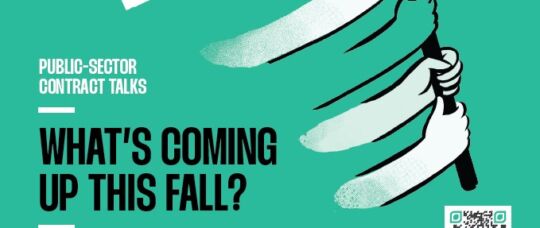UPDATE ON BARGAINING TALKS
The Front commun presented its demands to the government in the fall of 2022. One year later, where will we be in terms of contract talks? Will we have reached a settlement – or will we be getting ready to strike? No one can predict the future, but here’s some food for thought.
As of June 9, thirteen bargaining sessions had taken place at the central table. The Front commun, consisting of the CSN (Confédération des syndicats nationaux), the CSQ (Centrale des syndicats du Québec), the FTQ (Fédération des travailleurs et travailleuses du Québec), and the APTS (Alliance du personnel professionnel et technique de la santé et des services sociaux), has presented all of its demands, and the government has provided some details about its offers.
In terms of pay, the government hasn’t budged on its wretched offer of 9% over 5 years. It is not proposing any kind of cost-of-living indexation, implying that this would be too risky from its point of view. Neither has it put forward anything to ensure a general catch-up with other economic sectors, or to provide real gains for public-sector workers who have been getting poorer year after year. Stubbornly, it continues to offer the same pay increases that are totally disconnected from workers’ needs and will continue to impoverish them.
Based on government offers and the government’s own expectations in terms of inflation, by the end of the proposed collective agreement, public-sector workers would be poorer by at least 7.4%.
The Front commun believes that this is simply unacceptable – especially since the government took action in early June to vote an immediate 30% increase in MNAs’ pay, on the basis of the very principles that justify the demands of public-sector workers.
WE NEED THE GOVERNMENT TO GREATLY INCREASE ITS PAY OFFERS, TO REMOVE PUNITIVE MEASURES REGARDING RETIREMENT, AND TO PROVIDE CONCRETE AND SATISFACTORY ANSWERS TO OUR DEMANDS.
AS FOR WORKING CONDITIONS, EMPLOYERS WILL HAVE TO REVIEW THEIR PROPOSALS FOR SETBACKS IF THEY’RE LOOKING TO SETTLE.
In terms of retirement issues, the government has decided to attack pension benefits even as it acknowledges that the RREGOP (Government and Public Employees Retirement Plan) is in excellent financial shape. Arguing that recent improvements to the QPP (Québec Pension Plan) will induce people working in the public system to take early retirement, the government is taking back with one hand what it gave with the other. It wants to reduce benefits paid by the RREGOP so that workers will not retire until they’re older.
As if this weren’t enough, the government is putting even more pressure on workers who have accumulated 35 years of service – it wants to force them to work until age 57 before they can retire without being penalized.
When you decide to save money at the expense of public services, you’re definitely passing up on your opportunity to be an employer of choice. And you’re also fuelling the exodus of workers from our institutions!
In terms of insurance, the government argues that current benefits are generous enough, and that improvements were granted during the last round of bargaining talks. But the cost of insurance premiums keeps going up and the employer’s contribution is very small, or even non-existent in some cases.
Regarding our other demands, the government has had little to say. It has shown little or no openness regarding our other demands, about which it has said almost nothing. In fact, it is stubbornly committed to dealing exclusively with priorities based on its political program. In terms of working conditions and practice, it likes to say that it’s bringing solutions, but it’s keeping quiet about the major setbacks it’s trying to impose.
STEPPING UP THE PRESSURE TACTICS AND PREPARING FOR A STRIKE
Since the middle of May, each Front commun union has gotten a mandate to ratchet up its pressure tactics and prepare for strike action should it prove necessary. Throughout the summer, but especially early in the fall, pressure tactics will therefore intensify: this is the scenario we can expect in the short term. Hundreds of actions have already been organized across Québec to support demands at the central bargaining table (pay, pension, insurance, etc.) as well as sectoral demands (working conditions and practice). As the pace steps up, we will be heard and seen, and increased pressure on the government will make it impossible for it to ignore our demands.

ARE WE GOING TO STRIKE?
Even if contract talks aren’t advancing as we’d like, it’s important to leave time for a period of intensified pressure tactics, both in the workplace and in the public space. It’s obvious that a range of strategies should be tried before we choose to go on strike. Then, depending on what’s happening at the bargaining table, a strike might become necessary. At that point, there would be a consultation to obtain a strike mandate from members. As set out in the Labour Code, members would vote on the strike by secret ballot at a general assembly.
In the public sector, acquiring the right to strike is strictly regulated. Under the law, several months’ work are required before any strike action can take place, with various steps to be taken. Essential services must be maintained in health and social services, and these must be covered by a decision by the Tribunal administratif du travail. In addition, a mediation process must be implemented.
WHEN COULD A STRIKE TAKE PLACE?
Given the various time constraints, the right to strike would be acquired by September 2023. However, if a strike is to take place, several weeks will be needed to consult all members and obtain a strike mandate. It will be up to you, Front commun members, to decide if there will be a strike or not.
A key point is that strike action must be carried out to support negotiations. Choosing when to go on strike is a strategic decision that is based on ongoing analysis of the general situation and what’s happening at the bargaining table. In any case, if the government leaves us no choice but to go on strike, this could happen, at the appropriate time, as soon as consultations have ended in the fall of 2023. Should that be the case, full details (schedules, conditions for carrying out a strike action, etc.) will be communicated to you in due course.
Solidarity between 420,000 Front commun members is an immensely powerful force enabling us to carry out this fight.
We’re facing the government — together as one.



